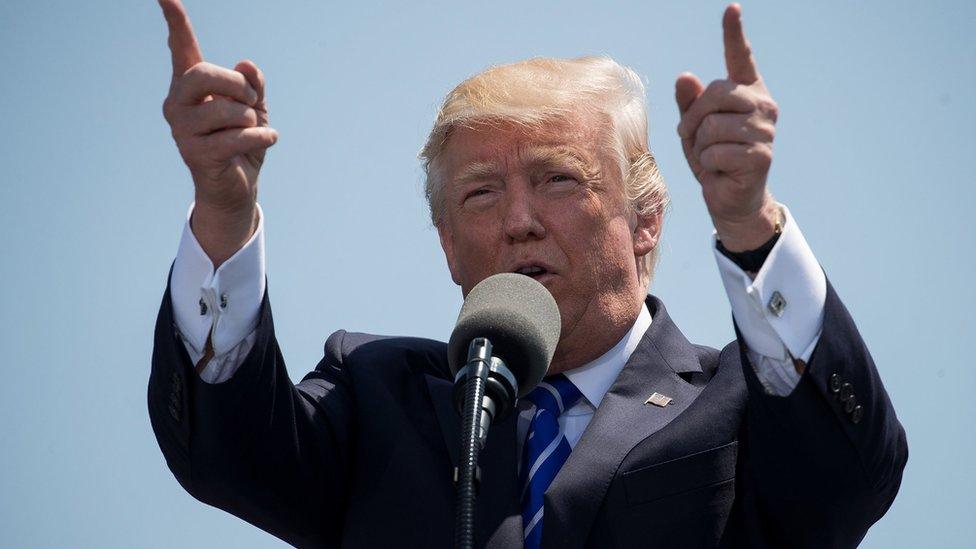Trump pulls trigger on Nafta negotiations
- Published

NAFTA was a centrepiece of Donald Trump's campaign
The US plans to start talks with Mexico and Canada over Nafta "as soon as practicable", the Trump administration said on Thursday.
The letter to congressional leaders provided formal notice of the administration's intent to move forward with a campaign pledge to reform the 1990s trade deal.
Mr Trump earlier threatened to end the agreement, calling it a job "killer".
Thursday's letter said the deal needs "modernisation".
In 2016, Canada and Mexico were America's second and third-largest trade partners after China.
US trade with the two countries has more than tripled since Nafta went into effect in 1994, with more than $1tn goods and services exchanged each year.
But tension has been mounting under Mr Trump, who made tough-on-trade talk a hallmark of his campaign.
In January, he withdrew from the Trans-Pacific Partnership.
He has also slapped tariffs on Canadian lumber and took to Twitter to talk about Canadian pricing of dairy products.
And on Thursday, the Commerce Department said it would investigate claims by Boeing that its Canadian aerospace rival Bombardier is unfairly subsidised by taxpayers and has been selling planes below cost in the US.
Reuters reported that, in response, Canada might reconsider its plans to buy 18 Boeing Super Hornets as it looks to upgrade its fleet of ageing fighter jets.
Dairy wars: Why is Trump threatening Canada over milk?
Has the US started a lumber trade war with Canada?
The Nafta letter from US Trade Representative Robert Lighthizer, who was sworn in this week, triggers a 90-day period, meaning talks would begin in August at the earliest.
It raised a range of issues, including digital trade and environmental practices, but offered little detail.
In recent months, Canadian federal ministers have been travelling frequently to the US to lobby America lawmakers whose states have strong trade ties with Canada on the importance of the cross-border economic relationship.
Canada's Foreign Affairs Minister, Chrystia Freeland, has also been in close contact with her Mexican counterparts on the Nafta file and will be in Mexico next week.
Ms Freeland said in a statement on Thursday that Canada remained "steadfastly committed to free trade in the North American region".
"We are at an important juncture that offers us an opportunity to determine how we can best align Nafta to new realities - and integrate progressive, free and fair approaches to trade and investment," she said.
Mexico also said it expects a "constructive" negotiation.
Mr Trump faces a political crisis in Washington related to an investigation of ties to Russia.
But the trade measures return him to one of his successful campaign themes, external, which struck a chord among some voters, who have seen US companies turn to cheaper, overseas workers for jobs once done at home.
Trump's trade agenda: Just what are his priorities?
Trump trade crackdown 'not about China'
US Commerce Secretary Wilbur Ross said in a statement that the goal of new Nafta talks was to find a "solution that is both fair and beneficial for all parties".
"Since the signing of Nafta, we have seen our manufacturing industry decimated, factories shuttered, and countless workers left jobless," he said. "President Trump is going to change that."
Mr Trump's protectionist stance breaks with Republican tradition, sounding closer to concerns voiced by labour unions and left-wing politicians such as Bernie Sanders.
But Democrats were quick to slam the letter as short on substance.
"The President's vague Nafta letter is a stark contrast with the aggressive promises he made to hard-working families during the campaign," California Democrat Nancy Pelosi, who leads the party in the House, said in a statement.
"For all his rhetoric, President Trump looks to be sorely disappointing American workers on trade."